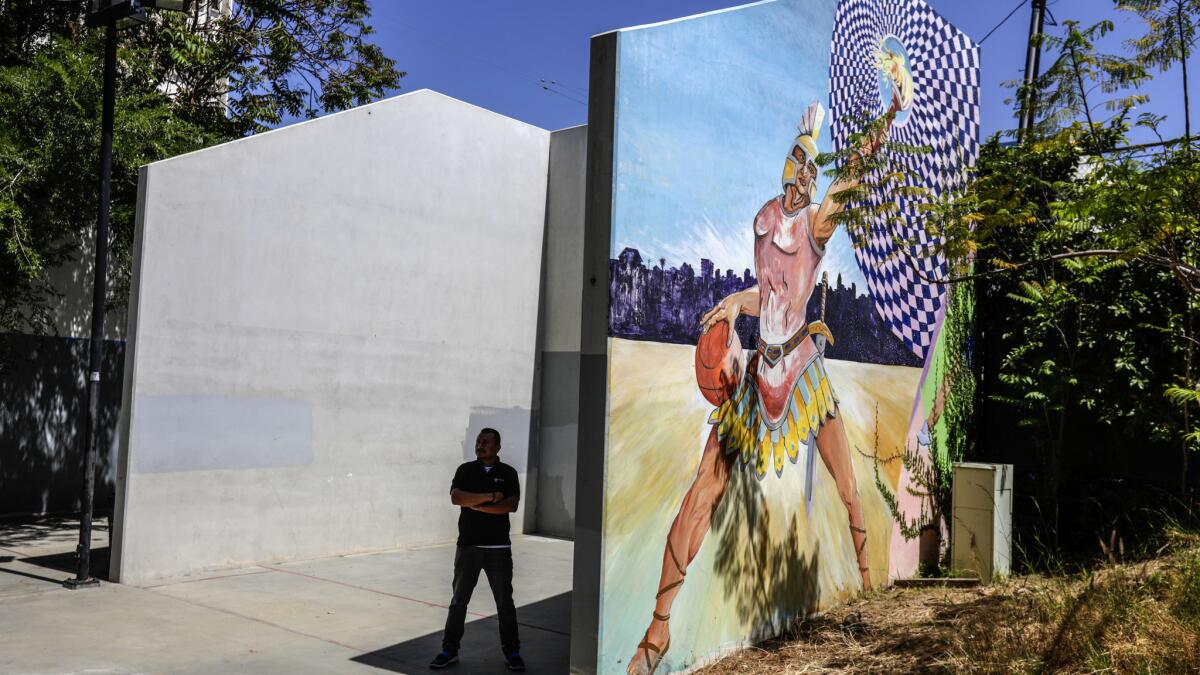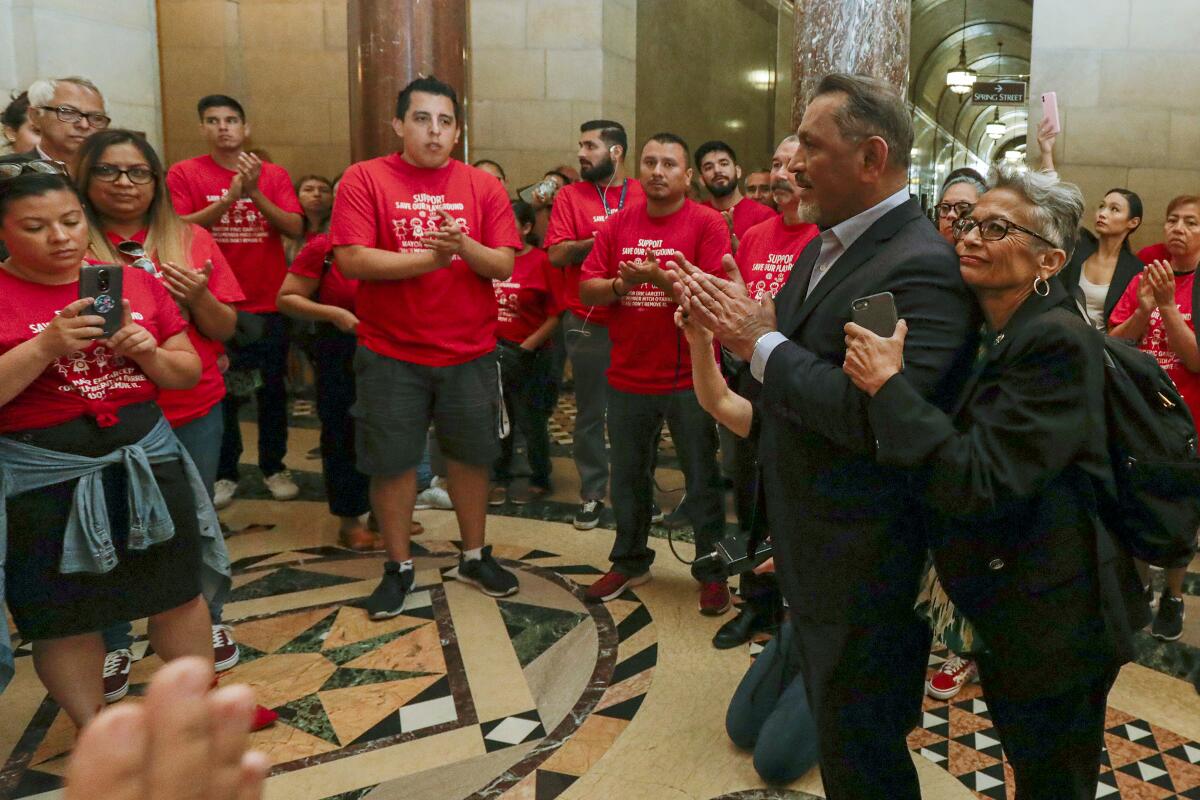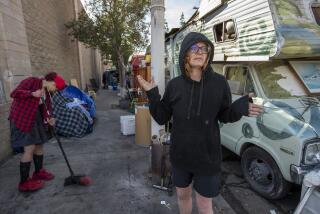An L.A. politician wants homeless housing on an Echo Park lot. His colleague calls it ‘Trumpian’

- Share via
Battles over where to build housing or shelters for homeless people are nothing new at Los Angeles City Hall, which has witnessed an uproar over such plans from Koreatown to Venice.
But the latest fight is poised to split the City Council itself, as one councilman promotes a plan that another is denouncing as “Trumpian.”
The dispute centers on a city lot in Echo Park that is currently being leased by a nonprofit, El Centro del Pueblo, for recreational space, including basketball and handball courts. The lot sits alongside the group’s Echo Park building, where it provides youth and family services aimed at preventing gang violence.
Councilman Mitch O’Farrell, who represents the area, wants L.A. to convert at least part of that Glendale Boulevard site into affordable housing for homeless people and seek bids from developers to remake it. City officials have argued that it is a prime spot because its zoning could allow for as many as 98 units of housing — more than other nearby sites would allow.

“The homeless crisis is not an issue — it’s the issue,” O’Farrell said. He argued that even if housing is built there, the city could still incorporate recreational space in the project, urging residents to work together with him on the plan.
“When we have ... a city-owned property that is underutilized, where we can accommodate the needs of the day, but also accommodate the needs of the community, that’s a great situation to work from,” O’Farrell said.
The plan has been vigorously protested by El Centro del Pueblo and many of its supporters, who have turned up at city meetings in red shirts that declare “Save Our Playground.” Many argued that the community was being mistreated.
“I don’t think it’s very smart to add an asset to a community by removing another asset,” said Luis Campos, who heads recreational programs for the nonprofit.
Campos, who said he had lived in Echo Park for decades, complained that as a Latino resident, “everything that’s been happening in our community, either we go along with it, or we are moved aside.”
At a recent hearing, El Centro del Pueblo and its supporters were joined by City Councilman Gil Cedillo, who called it “a false choice to pit young people in at-risk programs against affordable housing.”
Cedillo said in a later interview that the community group lacked trust in O’Farrell because of the way the plan was rolled out.
He called arguments against using other Echo Park sites for the proposed project deceptive and “Trumpian,” stressing that O’Farrell had supported clamping down on height restrictions on those nearby lots and could seek to reverse those changes.
“The councilman doesn’t appear to think much about the children of the district,” Cedillo said.
O’Farrell said he supported the mission of El Centro del Pueblo and stated that there had been outreach about the plan.
Cedillo “is trying to help a personal friend by leveraging a city resource,” O’Farrell said in a statement. “My focus is to address the crisis at hand.”
Such public clashes over development decisions are unusual on the L.A. City Council: Members usually defer to whoever represents the neighborhood when controversy erupts over a proposed development in that area. Cedillo, however, said that the majority of the families who get services at the Echo Park nonprofit live in his Eastside district.
El Centro del Pueblo is a longtime institution with political connections: Sandra Figueroa-Villa, its executive director, was appointed by Mayor Eric Garcetti to the Police Commission. A top aide to Cedillo has served on its board.
And at recent meetings at City Hall, former state senator Richard Polanco and Los Angeles Unified school board member Jackie Goldberg have spoken up for its cause.
Echo Park community members want homeless housing in their neighborhood, but “we really cannot afford to lose this playground in order to get that housing,” Goldberg told council members.
Others, however, have questioned whether the Echo Park site is being used as effectively as it could be. In a letter to O’Farrell, Echo Park Improvement Assn. President Andrew Garsten asserted that the space goes “largely unused.”
El Centro del Pueblo staffers have countered that some uses of the outdoor space, such as counseling sessions, may not be as readily visible to neighbors passing the facility. Supporters of the housing plan are unswayed.
“El Centro’s line has been, ‘We want this project, but not here.’ We can’t do that anymore,” said Tad Yenawine, a member of the Echo Park Neighborhood Council.
Cedillo, in turn, said the push from O’Farrell to put housing on the Echo Park site “seems like retribution.” When O’Farrell first ran for his seat, Figueroa-Villa backed his rival and at one point accused the O’Farrell campaign of using “intimidation tactics.”
After the dispute erupted over the housing plan, O’Farrell wrote to Garcetti and other city officials complaining that it was “actively engaging in a political campaign” when the nonprofit put up a sign rallying people to its cause. The sign included an image of a child with a placard that said, “Councilman Mitch O’Farrell don’t take our playground from us.”
“This is inappropriate on many levels and particularly unbecoming of an organization that receives city funding for their gang prevention work (which I have always supported). My patience and tolerance for this nonsense has worn thin,” O’Farrell wrote, urging the building department to take action.
The nonprofit was ordered to take down the sign because it “exceeded the maximum time allowed.”
Robert Aguayo, deputy director of El Centro del Pueblo, argued that engaging in such advocacy was “part of our role,” because the housing project would affect the community as a whole.
Many critics have argued that homeless housing could instead be built on another nearby lot owned by the city. At an August meeting, a city staffer said that many more parking spots would have to be replaced if housing were built there — something that could prove costly — instead of the Glendale Boulevard site.
Garsten was annoyed by the suggestion by Cedillo that the city could simply rezone other Echo Park parcels to accommodate more housing, reversing changes that were backed by local groups.
“To cavalierly say that we can override the zoning ... that’s not how the process is supposed to work,” Garsten said.
El Centro del Pueblo staffers, in turn, have been skeptical of promises that the housing project would provide appropriate space for young people to play. Aguayo raised concerns about the youths mingling with adults and said that when they have used other facilities off site, “our kids are not always welcome — they look at them as high-risk or troubled youth.”
“It sounds good on paper, but in reality, it hasn’t worked very well and the kids feel that they’re not wanted,” Aguayo said. “And that only adds to the issues that they already have.”
The City Council is scheduled to vote Wednesday on whether to put the Echo Park property up for development, launching a process for developers to turn in their proposals for affordable and supportive housing. If the council kicks off that process, the city would ultimately choose a winner and enter into an agreement with them to remake the site.
Cedillo has argued that the decision should first head to another council committee — one that he heads.
More to Read
Sign up for Essential California
The most important California stories and recommendations in your inbox every morning.
You may occasionally receive promotional content from the Los Angeles Times.










